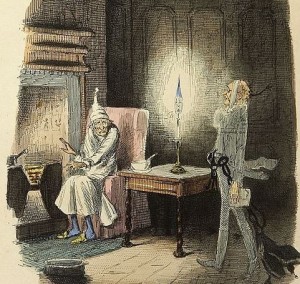A while back, it hit me that Charles Dickens’ “A Christmas Carol” may be an alternate ending for Luke 16:19-31 (the parable of the Rich Man and Lazarus):
“And he said, ‘Then I beg you, father, to send him to my father’s house—for I have five brothers—so that he may warn them, lest they also come into this place of torment.’ But Abraham said, ‘They have Moses and the Prophets; let them hear them.’ And he said, ‘No, father Abraham, but if someone goes to them from the dead, they will repent.’ He said to him, ‘If they do not hear Moses and the Prophets, neither will they be convinced if someone should rise from the dead.’”
. . . But Jacob Marley did rise, and Scrooge was convinced.
Consider also the striking similarity between Tiny Tim, a cripple whom Scrooge refuses to aid, and Lazarus, the beggar whom the Rich Man refused to aid. The miser in Jesus’ parable might just as easily have said, “If they are going to die, then they had better do it quickly, and decrease the surplus population.” And Scrooge’s Christmas Eve reformation is marked by his newfound care for this crippled boy, whose death he averts.
 The gospels were clearly on Dickens’ mind when he wrote the story. Recall this passage, in the mouth of Bob Cratchit: “Somehow [Tim] gets thoughtful, sitting by himself so much, and thinks the strangest things you ever heard. He told me, coming home, that he hoped the people saw him in the church, because he was a cripple, and it might be pleasant to them to remember upon Christmas Day, who made lame beggars walk, and blind men see.”
The gospels were clearly on Dickens’ mind when he wrote the story. Recall this passage, in the mouth of Bob Cratchit: “Somehow [Tim] gets thoughtful, sitting by himself so much, and thinks the strangest things you ever heard. He told me, coming home, that he hoped the people saw him in the church, because he was a cripple, and it might be pleasant to them to remember upon Christmas Day, who made lame beggars walk, and blind men see.”
In Dickens’ twist, Jacob Marley, a “Rich Man” in the same mold as Scrooge, is allowed to return in order to warn his business partner of the torment that awaits him if he doesn’t repent:
“‘You are fettered,’ said Scrooge, trembling. ‘Tell me why?’
‘I wear the chain I forged in life,’ replied the Ghost. ‘I made it link by link, and yard by yard; I girded it on of my own free will, and of my own free will I wore it. Is its pattern strange to you? . . . Or would you know,’ pursued the Ghost, ‘the weight and length of the strong coil you bear yourself? It was full as heavy and as long as this, seven Christmas Eves ago. You have laboured on it since. It is a ponderous chain!'”
In fact, Marley is the very reason behind Scrooge’s redemption–the one who requested a visitation to give his partner a warning strong enough to keep him from damnation: “I am here to-night to warn you, that you have yet a chance and hope of escaping my fate. A chance and hope of my procuring, Ebenezer.”
If I’m right, it’s really a brilliant literary turn on a familiar parable, and undoubtedly one reason “A Christmas Carol” is so beloved.
Image: Wikimedia Commons. Marley’s Ghost by , by John Leech, from Charles Dickens: A Christmas Carol












